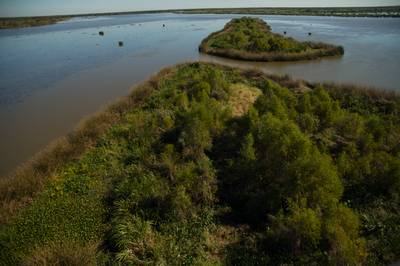Deepwater Horizon trustees announce agreement in principle for 10 Gulf early restoration projects
The trustees and BP have identified approximately $134 million in projects to be included in the next proposed phase of early restoration. This milestone comes five years after the Deepwater
Horizon oil spill in the
Gulf of Mexico.
The 10 proposed projects would benefit sea turtles, birds and fish; increase recreational opportunities; and improve nearshore and reef habitats. The proposed projects and estimated costs are:
- Osprey Restoration in Coastal Alabama – Baldwin and Mobile Counties, Alabama ($45,000)
- Point aux Pins Living Shoreline – Mobile County, Alabama ($2,300,000)
- Shell Belt and Coden Belt Roads Living Shoreline – Mobile County, Alabama ($8,050,000)
- Bon Secour National Wildlife Refuge Trail Enhancement – Alabama ($545,110)
- Seagrass Recovery at Gulf Islands National Seashore – Florida District ($136,700)
- Bike and Pedestrian Use Enhancements at Davis Bayou, Gulf Islands National Seashore – Mississippi District ($6,967,000)
- Restoring Living Shorelines and Reefs in Mississippi Estuaries – coastal Mississippi ($30,000,000)
- Texas Bird Rookery Islands– Galveston Bay and East Matagorda Bay, Texas ($20,603,770)
- Sea Turtle Early Restoration – Gulf of Mexico ($45,000,000)
- Pelagic Longline Bycatch Reduction – Gulf of Mexico ($20,000,000)
It is anticipated that these projects will be included in a draft Phase IV Early Restoration Plan that will be made available for public review and comment. So far, we have approved three phases of early restoration, encompassing 54 projects at an estimated cost of $698 million.
Early restoration allows for the jump start of restoration using up to $1 billion that BP has made available for jointly-agreed upon projects. In return, BP’s liability is reduced. Early restoration is not intended to provide the full extent of restoration needed to satisfy our claims against BP. The damage assessment—and restoration—will continue until the public is fully compensated for the natural resources and services that were lost as a result of the spill.













